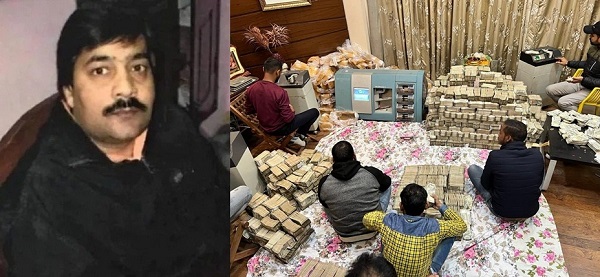New Delhi, (Samajweekly) The raids by multiple financial agencies are still underway at the different premises of Kanpur-based perfumer Piyush Jain, who was arrested by the Directorate General of GST Intelligence(DGGI) under the GST Act on Monday.
Cash worth around Rs 200 crore, gold bars and sandalwood oil have been found from his premises in Kanpur and Kannauj, following which more agencies have been roped in to probe the matter. IANS now takes a look at how it all started.
Tip of the iceberg was fake invoices of Rs 50,000
It all started when a special team of the Ahmedabad unit of DGGI found fake invoices of below Rs 50,000, which were issued by Ganpati Road Carriers to avoid Customs duty and taxes. Piyush Jain had connection with Ganpati Road Carriers.
After gathering information about Ganpati Road Carriers and its owners and partners, the DGGI team decided to raid their premises.
The first raid was conducted at the premises of Trimuti Fragrance Pvt ltd (the manufacturers of Shikhar brand pan masala and other tobacco products), which is reportedly owned by Piyush Jain.
The DGGI unit did not stop there, as they had more information about the uncounted cash. Later, another raid was conducted at Ganpati Road Carriers. The products made at Trimuti Fragrance Pvt ltd were being transported to different locations by Ganpati Road Carriers.
The manufacturer (Trimuti Fragrance) was supplying the goods, but was not paying the applicable taxes. Ganpati Road Carriers used to generate fake invoices of below Rs 50,000.
“We intercepted four trucks full of goods. We were surprised as all the invoices were of below Rs 50,000. For products which have value of more than Rs 50,000, you will have to generate e-way bills, otherwise the states will not allow the good-laden truck to enter their territory. This was the reason they created all the bills of below Rs 50,000 to give us a slip. But we got suspicious and discussed the matter with our seniors to conduct raids at the premises of the transporter and the manufacturer,” said a source.
Ganpati Road Carriers always generated multiple invoices in the name of nonexistent firms. It also used to collect cash payments against the sale/purchase of the goods and would return them to Trimuti Fragrance after deducting the commission.
On December 22, the DGGI seized four goods laden trucks from outside the factory premises of Trimuti Fragrance, which were cleared from the factory without invoices or e-way bills, confirming the suspicion of the intelligence agencies.
The officials found that all the finished products were being supplied without paying GST. The authorised signatory of the company confessed to this during interrogation.
The GST officials also recovered 200 fake invoices issued by Ganpati Road Carriers.
Recovery of bundles of notes
After this, the authorities sent another team to the residential address of Odochem Industries, a private firm which supplied raw materials to Trimuti Fragrance Private Ltd.
During the search proceedings, huge amount of cash was found wrapped in paper.
“It was a heap of cash. We had to take the help of officials from the State Bank of India, who suggested that without note counting machine, it was not possible to count the cash. Around 20 counting machines were then used. We kept on counting the cash for three days, till December 28, which came to around Rs 200 crore,” an official said.
The DGGI team then roped in the Income Tax Department as the matter was not just about avoiding Customs duty, but also involved tax evasion.
The interrogation
The DGGI team then detained Praveen Jain, the owner of Ganpati Road Carriers. But he did not give satisfactory answers to the probe team and even tried to mislead them. The team found that Piyush Jain, the brother-in-law of Praveen Jain, played a big role in the entire nexus. A team was immediately sent to the residence of Piyush in Kanpur from where he was detained.
“We questioned him about the cash but he tried to avoid our all queries. We then took him to his paternal house in Kannauj to conduct a search and recovered 2.5 kg gold from there,” the official said.
How did he hide the cash and gold?
Piysh Jain hid the cash in a secret chamber in the basement of his house. The cash was wrapped in paper. There were sacks full of cash, while gold bars were hidden in a cupboard.
The DGCI officials have so far recovered 23 kg gold, sandalwood oil worth Rs 6 crore, 500 keys, 109 locks and 18 lockers. The financial intelligence agencies have claimed that Piyush Jain has four properties in Kanpur, seven in Kannauj, two in Mumbai, and one in Delhi. He also reportedly has two properties in Dubai, which the agencies are probing.
The DGGI has lodged a case under Section 67 of the GST Act. The I-T Department will look into the tax evasion angle of the case. The Directorate of Revenue Intelligence (DRI) is also probing the matter as the gold bars were reportedly brought from Dubai.
A comprehensive report is being prepared by the DGGI, which will be handed over to the Enforcement Directorate. The ED can in future file case under the Prevention of Money Laundering Act (PMLA).










